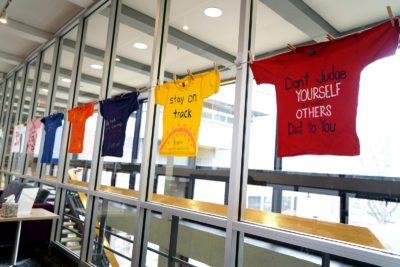
In a speech delivered on Thursday at George Mason University, U.S. Secretary of Education Betsy DeVos said the guidance established by the Obama administration regarding sexual assault on college campuses and Title IX was a “failed system,” according to a U.S. Department of Education press release.
Title IX, which was passed into law in 1972 by the Nixon Administration, prohibits discrimination on the basis of sex in educational and government-funded programs, according to the official website for the Education Department.
DeVos said Title IX sexual assault cases failed students, only providing a system of “kangaroo courts” that neither gave justice to rape survivors nor fairly protected students falsely accused, according to a transcription of her speech included in the release.
Local organizations dedicated to providing services for those affected by sexual violence emphasized that in the wake of this announcement, increased efforts on the part of Boston school administrations, as well as the Massachusetts government, are fundamentally necessary.
Stephanie DeCandia, the director of programs at the Boston Area Rape Crisis Center, said while the organization is aware of many schools in the Boston area that have devoted increased time and effort to addressing sexual violence on campus and aiding student survivors, DeVos’ propositions may encourage less able schools to not make any progressive changes.
“If the school was hesitant about certain things, didn’t have a lot of resources … this kind of gives them an opportunity to maybe not move forward in order to better the resources on campus and enhance the services they are providing,” DeCandia said.
The Trump administration’s ability to find any meaningful policy replacement for the current guidance provided by the Obama administration is unlikely, DeCandia said. In the meantime, DeCandia said the possible Title IX changes on Boston campuses will boil down to the individual school and student engagement.
“It’s really about how students now are going to have to be clear with their schools,” DeCandia said. “And, whether the schools are going to change anything or are going to continue on with the resources they have in place.”
Toni Troop, spokesperson for Jane Doe, Inc., a Boston-based nonprofit devoted to advocacy efforts for victims of sexual abuse, said she was not surprised to hear this news from the Trump administration, and voiced concern with the implications of DeVos’ comments on the American culture at large.
In light of the potential changes to Title IX, Troop encouraged students to actively campaign for sexual violence prevention and reporting programs on their campus.
“Students [need] to redouble their efforts to work with their local administrations to ensure that their school establish policy and practices,” Troop said.
Troop said it is not only the responsibility of local schools to ensure policies are in place, but businesses and the government as well.
“We have to recognize that there is a role for local government, businesses, [and] schools themselves to play,” Troop said. “To ensure they have policies in place regardless of what might happen federally.”
Several Boston-based students expressed dissatisfaction with DeVos’ remarks on Title IX, and said the secretary’s hefty consideration of the accused as opposed to victims is highly concerning.
Julie Giffin, a sophomore studying journalism at Emerson College, said she views DeVos’ comments as damaging to women.
“She should not be telling survivors to drop out of school until their rapist has graduated,” Giffin said. “By letting offenders stay in school, this leads to repeat behavior instead of giving them a proper punishment. People like Betsy are the reason why young women continue to not feel supported or protected by laws in this country.”
Meagan Quinn, a junior majoring in social work at Wheelock College, said DeVos’ statements on Title IX are false and damaging.
“Last year for a school reform project, I spent some time interviewing our Title IX coordinator and I learned about how effective and fair the process really is,” Quinn said. “Investigation is a very large part of a Title IX coordinator’s job, so DeVos’ belief that it’s too easy for men to be falsely accused has zero basis.”
Kasey Leibas, a sophomore studying comedy at Emerson, said the proposed changes may act as a barrier, preventing true victims from speaking up about their assault.
“False sexual harassment [and assault] accusations are being focused on in these changes when that shouldn’t be the case,” Leibas said. “Protection and focus on false … accusations takes away even more from real victims and will make victims feel less inclined to speak up. These changes make it seem like victims lie and that we need to protect sexual assaulters more to give them a ‘fair hearing.’”














